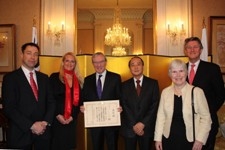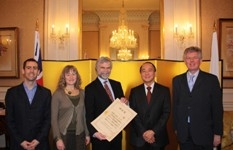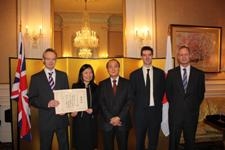Ambassador Ebihara honours Rear Admiral Richard Cobbold, Professor James Ferguson Skea and The British Japanese Law Association
2017/10/24
On, February 5 2009, Ambassador Shin Ebihara presented Rear Admiral Richard Cobbold, Professor James Ferguson Skea and The British Japanese Law Association with Certificates of Commendation.
 Rear Admiral Richard Cobbold was commended for his distinguished service and contribution to the deepening of mutual understanding and friendship between Japan and the UK. He embarked upon a long and distinguished military career in 1960, serving with the Royal Navy for more than 30 years. Then, in 1994 he accepted the position of Director of the Royal United Services Institute for Defence Studies (RUSI). As the head of one of the most globally distinguished research institutions in the field of defence and security studies, he adopted a number of initiatives, including strengthening relations with Japanese experts. Under his directorship, the RUSI convened the UK-Japan security conference, jointly with the Japanese National Institute for Defence Studies (NIDS), four times, fostering ever closer intellectual contacts between British and Japanese security experts. When he was commended, he remarked: "It is so special to be commended for something which is such a pleasure to do. I hope I can continue to contribute in a small way."
Rear Admiral Richard Cobbold was commended for his distinguished service and contribution to the deepening of mutual understanding and friendship between Japan and the UK. He embarked upon a long and distinguished military career in 1960, serving with the Royal Navy for more than 30 years. Then, in 1994 he accepted the position of Director of the Royal United Services Institute for Defence Studies (RUSI). As the head of one of the most globally distinguished research institutions in the field of defence and security studies, he adopted a number of initiatives, including strengthening relations with Japanese experts. Under his directorship, the RUSI convened the UK-Japan security conference, jointly with the Japanese National Institute for Defence Studies (NIDS), four times, fostering ever closer intellectual contacts between British and Japanese security experts. When he was commended, he remarked: "It is so special to be commended for something which is such a pleasure to do. I hope I can continue to contribute in a small way."
 Professor James Ferguson Skea was similarly recognised for his contribution, as Co-Chair, to the success of the Japan-UK Joint Research Project, "Roadmap to a Low-Carbon World". Having obtained a Doctoral degree from the University of Cambridge in the late 1970s, Professor Skea continued his research in the areas of climate change and energy. Over the years these subjects attracted growing attention and moved to the top of the global agenda. Thus in 2006, following the G8 Gleneagles summit, the governments of Japan and the UK launched a joint research initiative, the "Japan-UK Low Carbon Societies Project". Professor Skea co-chaired all three workshops on this project, two in Tokyo and one in London, in conjunction with the Japanese National Institute for Environmental Studies. As Japan and the UK continue to strengthen their global partnership, Professor Skea's contribution to the Project can be seen as a prominent example of bilateral cooperation on one of the most important issues on the global agenda. He greeted the decision to award him a commendation by declaring how privileged and honoured he felt, while paying tribute to the other individuals and organisations who had contributed to the project. "I hope," he concluded, "that the Network of Low Carbon Society Research Institutes, on which Japan is leading, will provide practical insights to take us forward."
Professor James Ferguson Skea was similarly recognised for his contribution, as Co-Chair, to the success of the Japan-UK Joint Research Project, "Roadmap to a Low-Carbon World". Having obtained a Doctoral degree from the University of Cambridge in the late 1970s, Professor Skea continued his research in the areas of climate change and energy. Over the years these subjects attracted growing attention and moved to the top of the global agenda. Thus in 2006, following the G8 Gleneagles summit, the governments of Japan and the UK launched a joint research initiative, the "Japan-UK Low Carbon Societies Project". Professor Skea co-chaired all three workshops on this project, two in Tokyo and one in London, in conjunction with the Japanese National Institute for Environmental Studies. As Japan and the UK continue to strengthen their global partnership, Professor Skea's contribution to the Project can be seen as a prominent example of bilateral cooperation on one of the most important issues on the global agenda. He greeted the decision to award him a commendation by declaring how privileged and honoured he felt, while paying tribute to the other individuals and organisations who had contributed to the project. "I hope," he concluded, "that the Network of Low Carbon Society Research Institutes, on which Japan is leading, will provide practical insights to take us forward."
 The British Japanese Law Association was commended for its contribution to promoting exchange between Japanese and British lawyers. The Association has organised a number of seminars and events to introduce each country's legal system and provides a valuable forum for exchange on the two countries' different legal backgrounds. Promoting mutual understanding of our countries' legal systems is one of the most important bases upon which deeper cooperation in legal and other fields can be built. As the Association was commended, its representative commented: "The British-Japanese Law Association is extremely pleased to receive the Commendation. The receipt of this prestigious award has already helped to raise the profile of the BJLA, in turn improving its ability to strengthen the links between those involved in the provision of legal services in the UK and Japan."
The British Japanese Law Association was commended for its contribution to promoting exchange between Japanese and British lawyers. The Association has organised a number of seminars and events to introduce each country's legal system and provides a valuable forum for exchange on the two countries' different legal backgrounds. Promoting mutual understanding of our countries' legal systems is one of the most important bases upon which deeper cooperation in legal and other fields can be built. As the Association was commended, its representative commented: "The British-Japanese Law Association is extremely pleased to receive the Commendation. The receipt of this prestigious award has already helped to raise the profile of the BJLA, in turn improving its ability to strengthen the links between those involved in the provision of legal services in the UK and Japan."
 Rear Admiral Richard Cobbold was commended for his distinguished service and contribution to the deepening of mutual understanding and friendship between Japan and the UK. He embarked upon a long and distinguished military career in 1960, serving with the Royal Navy for more than 30 years. Then, in 1994 he accepted the position of Director of the Royal United Services Institute for Defence Studies (RUSI). As the head of one of the most globally distinguished research institutions in the field of defence and security studies, he adopted a number of initiatives, including strengthening relations with Japanese experts. Under his directorship, the RUSI convened the UK-Japan security conference, jointly with the Japanese National Institute for Defence Studies (NIDS), four times, fostering ever closer intellectual contacts between British and Japanese security experts. When he was commended, he remarked: "It is so special to be commended for something which is such a pleasure to do. I hope I can continue to contribute in a small way."
Rear Admiral Richard Cobbold was commended for his distinguished service and contribution to the deepening of mutual understanding and friendship between Japan and the UK. He embarked upon a long and distinguished military career in 1960, serving with the Royal Navy for more than 30 years. Then, in 1994 he accepted the position of Director of the Royal United Services Institute for Defence Studies (RUSI). As the head of one of the most globally distinguished research institutions in the field of defence and security studies, he adopted a number of initiatives, including strengthening relations with Japanese experts. Under his directorship, the RUSI convened the UK-Japan security conference, jointly with the Japanese National Institute for Defence Studies (NIDS), four times, fostering ever closer intellectual contacts between British and Japanese security experts. When he was commended, he remarked: "It is so special to be commended for something which is such a pleasure to do. I hope I can continue to contribute in a small way." Professor James Ferguson Skea was similarly recognised for his contribution, as Co-Chair, to the success of the Japan-UK Joint Research Project, "Roadmap to a Low-Carbon World". Having obtained a Doctoral degree from the University of Cambridge in the late 1970s, Professor Skea continued his research in the areas of climate change and energy. Over the years these subjects attracted growing attention and moved to the top of the global agenda. Thus in 2006, following the G8 Gleneagles summit, the governments of Japan and the UK launched a joint research initiative, the "Japan-UK Low Carbon Societies Project". Professor Skea co-chaired all three workshops on this project, two in Tokyo and one in London, in conjunction with the Japanese National Institute for Environmental Studies. As Japan and the UK continue to strengthen their global partnership, Professor Skea's contribution to the Project can be seen as a prominent example of bilateral cooperation on one of the most important issues on the global agenda. He greeted the decision to award him a commendation by declaring how privileged and honoured he felt, while paying tribute to the other individuals and organisations who had contributed to the project. "I hope," he concluded, "that the Network of Low Carbon Society Research Institutes, on which Japan is leading, will provide practical insights to take us forward."
Professor James Ferguson Skea was similarly recognised for his contribution, as Co-Chair, to the success of the Japan-UK Joint Research Project, "Roadmap to a Low-Carbon World". Having obtained a Doctoral degree from the University of Cambridge in the late 1970s, Professor Skea continued his research in the areas of climate change and energy. Over the years these subjects attracted growing attention and moved to the top of the global agenda. Thus in 2006, following the G8 Gleneagles summit, the governments of Japan and the UK launched a joint research initiative, the "Japan-UK Low Carbon Societies Project". Professor Skea co-chaired all three workshops on this project, two in Tokyo and one in London, in conjunction with the Japanese National Institute for Environmental Studies. As Japan and the UK continue to strengthen their global partnership, Professor Skea's contribution to the Project can be seen as a prominent example of bilateral cooperation on one of the most important issues on the global agenda. He greeted the decision to award him a commendation by declaring how privileged and honoured he felt, while paying tribute to the other individuals and organisations who had contributed to the project. "I hope," he concluded, "that the Network of Low Carbon Society Research Institutes, on which Japan is leading, will provide practical insights to take us forward." The British Japanese Law Association was commended for its contribution to promoting exchange between Japanese and British lawyers. The Association has organised a number of seminars and events to introduce each country's legal system and provides a valuable forum for exchange on the two countries' different legal backgrounds. Promoting mutual understanding of our countries' legal systems is one of the most important bases upon which deeper cooperation in legal and other fields can be built. As the Association was commended, its representative commented: "The British-Japanese Law Association is extremely pleased to receive the Commendation. The receipt of this prestigious award has already helped to raise the profile of the BJLA, in turn improving its ability to strengthen the links between those involved in the provision of legal services in the UK and Japan."
The British Japanese Law Association was commended for its contribution to promoting exchange between Japanese and British lawyers. The Association has organised a number of seminars and events to introduce each country's legal system and provides a valuable forum for exchange on the two countries' different legal backgrounds. Promoting mutual understanding of our countries' legal systems is one of the most important bases upon which deeper cooperation in legal and other fields can be built. As the Association was commended, its representative commented: "The British-Japanese Law Association is extremely pleased to receive the Commendation. The receipt of this prestigious award has already helped to raise the profile of the BJLA, in turn improving its ability to strengthen the links between those involved in the provision of legal services in the UK and Japan."Embassy of Japan
